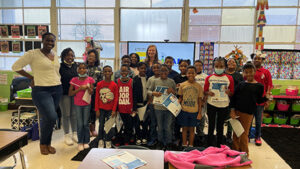The Department of Neurosurgery at the University of Alabama at Birmingham is lending its expertise to promote STEM fields in area elementary schools. STEM consists of the disciplines of science, technology, engineering and mathematics.
“We’re joining the effort to help fill the health care workforce pipeline with better prepared, highly engaged students who are interested in a career in one of the STEM fields,” says James Markert, M.D., chair of Neurosurgery in the UAB Marnix E. Heersink School of Medicine. “That’s why we launched a STEM-in-schools volunteer initiative within the department.”
Anastasia Smith, clinical research manager in the Division of Pediatric Neurosurgery, visited Princeton Elementary School’s Science, Technology, Engineering, Arts and Mathematics Club, where she delivered the first presentation from the department.
“The Princeton club is made up of fourth and fifth graders who have shown interest in pursuing STEM careers,” Smith says. “Even at a fairly young age, these students had mature questions about different STEM fields and job responsibilities. Several have already decided what STEM career they want to pursue.”
Smith’s presentation focused on public health, clinical research and how both fields interface with pediatric neurosurgery.
“Careers in public health are important because there are a lot of great surgeons who have the desire and clinical experience to help improve the lives of patients, and public health professionals help them get their ideas tested to produce meaningful impact in the form of new knowledge, manuscripts, protocol, new drugs and devices,” Smith adds.
Through STEM education, science, technology, engineering and mathematics are combined into a cohesive system that prepares students to transform their environment with sustainable and innovative solutions.
Science gives students an opportunity to develop better research and critical thinking skills, allowing them to gain a deeper understanding of the world around us. Technology prepares learners to work in a high-tech environment that is constantly innovating.
Engineering enables young people to improve problem-solving skills and apply knowledge to various projects. Mathematics teaches students to analyze information and eliminate errors when making decisions and designing solutions.
“The students and their teacher all expressed interest in welcoming more visitors from UAB and continuing to learn about STEM careers,” Smith says. “During my visit, we had good discussion, fun questions and did a group activity.”
Smith has since visited Inglenook Elementary School and plans to continue visiting other schools and STEM clubs to share the various opportunities available within STEM careers.





